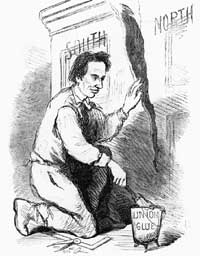Presidents’ Day Facial Hair Countdown #1 – Abraham Lincoln
1. Abraham Lincoln
Fast Facts
Lifetime: 1809-1865
Presidency: 16th
Facial Hair Style: Full beard
Least Favorite Play: Our American Cousin
Really, could it have been anyone else? Even for one with such an important historical resume, our 16th President’s beard still manages to garner a great deal of attention. There are even stories surrounding its origins, which can be traced back to a letter Lincoln received from eleven-year old Grace Bedell, who urged him to grow a beard only a few weeks before he was elected in 1860.
Though he had made a name for himself as an Illinois lawyer and later a legislator, Lincoln’s mythos is inexorably tied up with the American Civil War. Though the storm of secession had been brewing for some time, it was the 1860 election of the Republican Lincoln without any electoral votes from the South that was the impetus for South Carolina and ten more states’ eventual secession. When Confederate troops bombarded Fort Sumter on April 12, 1861, the nation found itself officially at war.
The eventual conflict would last more than four years and still stands as the bloodiest war in United States history. Though Lincoln himself was not a military man, he trusted in his generals, particularly Ulysses S. Grant (number seven in the Presidential facial hair list!) who would wage several successful campaigns both in the Western and Eastern Theaters of the war. Some of Lincoln’s actions such as the suspension of habeas corpus for some rebels earned him ire both from his contemporaries and modern historians, but he is still credited with preserving the Union throughout extreme adversity.
The issue of Lincoln and slavery is a tricky one. Though far greater minds than I have written on the topic at length, I’ll attempt to make the issue as palatable as possible. The traditional history is that Lincoln’s use of military force against the rebels was at first merely to preserve the Union. Even without citing slavery as a motivator, public opinion was anything but united. Many Northerners, especially in places like New York, were unwilling to fight and die for a sectional conflict, with numerous draft riots as evidence.
Even the famed Emancipation Proclamation was meant as a blow against the Confederate economy and a practical solution to the question of liberated slaves, not as a humanitarian gesture. Slaves in areas not in rebellion, such as Delaware, were not freed by the Emancipation Proclamation and would only receive it with the ratification of the Thirteenth Amendment.

Lincoln (sans beard) trying to glue the country back together. No wonder it took the guy four years to do it.
However, most biographers would agree that over time, Lincoln’s heart softened with regards to the issue of slavery. Lincoln’s meetings with black abolitionist Frederick Douglass have been credited as helping to change his stance. After his reelection in 1864 and as the war began to draw to a close, Lincoln was more outspoken against “the peculiar institution,” most notably supporting the Thirteenth Amendment to the US Constitution, which would outlaw involuntary servitude.
On Good Friday 1865, as the Civil War was winding down, Abraham Lincoln and his beard met their end on the wrong end of an assassin’s bullet. John Wilkes Booth, a stage actor and Confederate sympathizer, shot Lincoln in the head in a box at Ford’s Theater in Washington D.C. before stabbing US Army Major Henry Rathbone and trying to make his escape. Lincoln lived for a few more hours before passing away on the morning of April 15, the first US President to be assassinated.
Through all of the troubles and controversy the United States underwent during his Presidency, Lincoln is still upheld as one of our nation’s great Presidents. Schools and cities nationwide and even Mount Rushmore attest to the impact he had on our country. In my humble opinion he also had the greatest facial hair to ever inhabit the Oval Office. I’d like to think that it wasn’t a coincidence.
Tags: Abraham Lincoln, beard, Facial Hair, Lincoln, list, moustache, mustache, President, Presidents Day, top 10, Union Army




Recent Comments